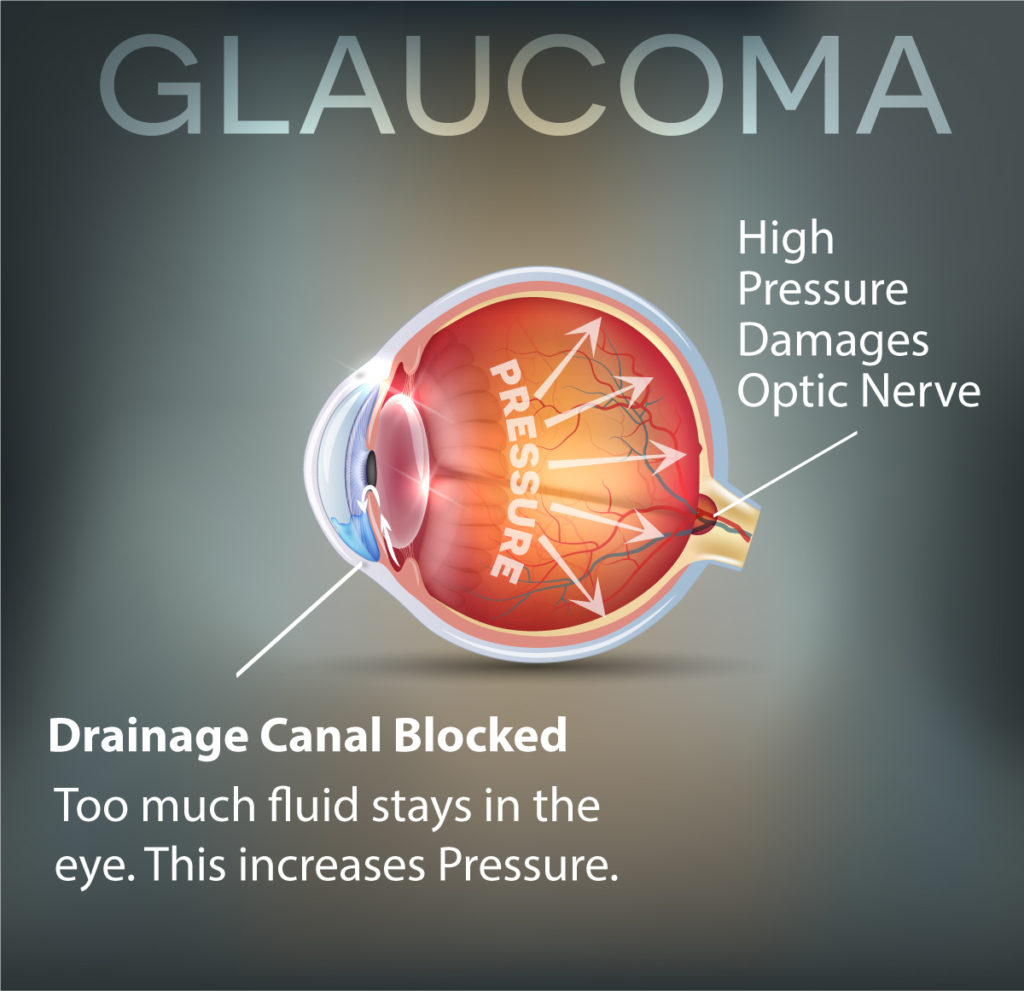What is Glaucoma?

Glaucoma is an eye disease that is the leading cause of blindness in those over 60 in the US. It is a group of diseases that can damage the eye’s optic nerve and result in vision loss and blindness. Glaucoma results from a buildup of fluid that cannot correctly drain from the eye, causing pressure and damage to the optic nerve. Without treatment, glaucoma can result in non-reversible vision loss.
The optic nerve is a bundle of more than 1 million nerve fibers. It connects the retina to the brain. The retina is the light-sensitive tissue at the back of the eye. A healthy optic nerve is necessary for good vision. Glaucoma damages the optic nerve slowly over time, which is why it is always a good idea to get your eyes checked regularly. Early detection of Glaucoma is the best defense for your vision.
Request An Eye ExamCall: (248) 333-2900
Types of Glaucoma
Open-angle glaucoma. This is the most common type of glaucoma. The structures of the eye appear normal, but fluid in the eye does not flow properly through the drain of the eye, called the trabecular meshwork.
Angle-closure glaucoma. This type of glaucoma is less common but can cause a sudden buildup of pressure in the eye. Drainage may be poor because the angle between the iris and the cornea (where a drainage channel for the eye is located) is too narrow. Or, the pupil opens too wide, narrowing the angle and blocking the flow of the fluid through that channel.
Request An Eye ExamCall: (248) 333-2900
Signs and Symptoms of Glaucoma
You may not even notice the signs and symptoms of glaucoma right away because of how gradually it develops over time. This makes it important to schedule yearly comprehensive exams. This is a great way to ensure that you detect this disease early on. However, you may be experiencing the following symptoms if you’ve developed glaucoma:
- Severe pain in the eye or forehead
- Redness of the eye
- Decreased or blurred vision
- Seeing rainbows or halos
- Headaches
- Nausea
- Vomiting
Noticing any of these signs? Then it would be a good idea to schedule an eye exam today!
Request An Eye ExamCall: (248) 333-2900
Who is at Risk?
Anyone can develop glaucoma and it can Some people are at higher risk than others. They include:
- People who are diabetic
- African Americans over age 40
- Everyone over age 60, especially Hispanic Americans
- People with a family history of glaucoma
Immediate treatment for early-stage, open-angle glaucoma can delay the progression of the disease. A comprehensive dilated eye exam by one of our eye care professionals can reveal more risk factors, such as high eye pressure, the thinness of the cornea, and abnormal optic nerve anatomy. In some people with certain combinations of these high-risk factors, medicines in the form of eyedrops reduce the risk of developing glaucoma by about half.
If you are in an at-risk group, then make sure to get your eyes checked at least once a year.
Request An Eye ExamCall: (248) 333-2900
Treatment Options
After an exam and diagnosis, you and your eye doctor will work together to create the right treatment plan for you. Depending on what stage your glaucoma is in, you may have one of these treatment options:
Eye Drops
Glaucoma in its early stages can be managed with eye drops. These can lower eye pressure and stop the progression of the disease, but not reverse it.
Minimally Invasive Glaucoma Surgery (MIGS)
This procedure is less intrusive than traditional surgery and is used during the early stages of glaucoma. It is used to improve the eye’s natural drainage or decrease fluid production in the eye.
Through this method, our Michigan ophthalmologists and optometrists can improve your eye’s natural drainage or decrease eye fluid production depending on where the inherent issue lies. You’ll be back on your feet doing the things you want, whenever you want, in no time after seeing us.
Traditional Glaucoma Surgery
Typically utilized during more advanced stages of glaucoma, traditional surgery uses state-of-the-art shunt technology. The eye’s natural drainage can be improved, fluid can be removed from the eye, or fluid production can be decreased depending on your specific needs. This surgery can help avoid long-term vision loss.
Although recovery may last between two to four weeks, glaucoma surgery will help you avoid worsening vision in the long term and maintain your lifestyle.
Request An Eye ExamCall: (248) 333-2900
Why Michigan Residents Choose Grosinger, Spigelman & Grey
At Grosinger, Spigelman & Grey, you can trust your vision to our expert and caring team of ophthalmologists and optometrists. Our mission is to provide you with quality care and excellent service. From your initial consultation to completing your treatment plan, our knowledgeable staff will guide you through every step of the process.
Request An Eye ExamCall: (248) 333-2900
